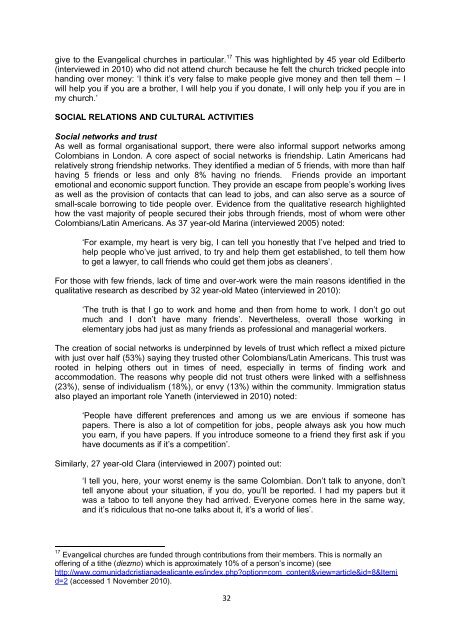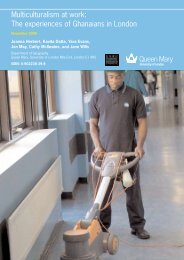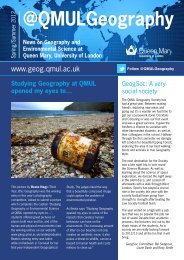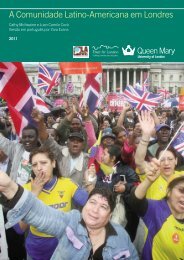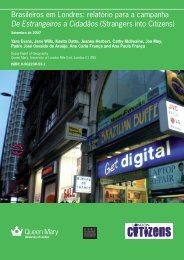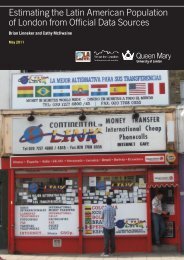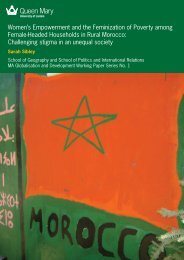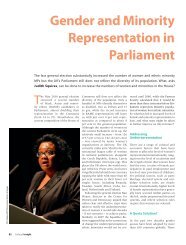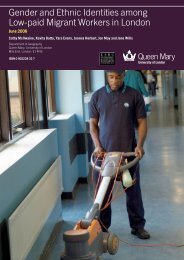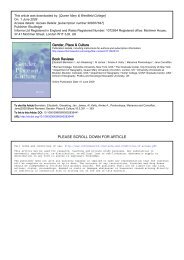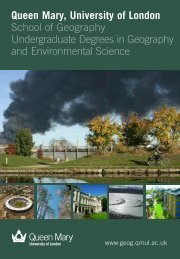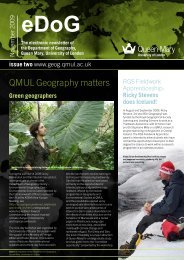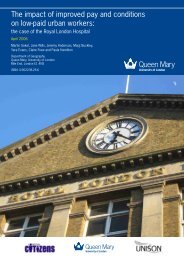The Colombian community in London - Geography - Queen Mary ...
The Colombian community in London - Geography - Queen Mary ...
The Colombian community in London - Geography - Queen Mary ...
- No tags were found...
Create successful ePaper yourself
Turn your PDF publications into a flip-book with our unique Google optimized e-Paper software.
give to the Evangelical churches <strong>in</strong> particular. 17 This was highlighted by 45 year old Edilberto<br />
(<strong>in</strong>terviewed <strong>in</strong> 2010) who did not attend church because he felt the church tricked people <strong>in</strong>to<br />
hand<strong>in</strong>g over money: „I th<strong>in</strong>k it‟s very false to make people give money and then tell them – I<br />
will help you if you are a brother, I will help you if you donate, I will only help you if you are <strong>in</strong><br />
my church.‟<br />
SOCIAL RELATIONS AND CULTURAL ACTIVITIES<br />
Social networks and trust<br />
As well as formal organisational support, there were also <strong>in</strong>formal support networks among<br />
<strong>Colombian</strong>s <strong>in</strong> <strong>London</strong>. A core aspect of social networks is friendship. Lat<strong>in</strong> Americans had<br />
relatively strong friendship networks. <strong>The</strong>y identified a median of 5 friends, with more than half<br />
hav<strong>in</strong>g 5 friends or less and only 8% hav<strong>in</strong>g no friends. Friends provide an important<br />
emotional and economic support function. <strong>The</strong>y provide an escape from people‟s work<strong>in</strong>g lives<br />
as well as the provision of contacts that can lead to jobs, and can also serve as a source of<br />
small-scale borrow<strong>in</strong>g to tide people over. Evidence from the qualitative research highlighted<br />
how the vast majority of people secured their jobs through friends, most of whom were other<br />
<strong>Colombian</strong>s/Lat<strong>in</strong> Americans. As 37 year-old Mar<strong>in</strong>a (<strong>in</strong>terviewed 2005) noted:<br />
„For example, my heart is very big, I can tell you honestly that I‟ve helped and tried to<br />
help people who‟ve just arrived, to try and help them get established, to tell them how<br />
to get a lawyer, to call friends who could get them jobs as cleaners‟.<br />
For those with few friends, lack of time and over-work were the ma<strong>in</strong> reasons identified <strong>in</strong> the<br />
qualitative research as described by 32 year-old Mateo (<strong>in</strong>terviewed <strong>in</strong> 2010):<br />
„<strong>The</strong> truth is that I go to work and home and then from home to work. I don‟t go out<br />
much and I don‟t have many friends‟. Nevertheless, overall those work<strong>in</strong>g <strong>in</strong><br />
elementary jobs had just as many friends as professional and managerial workers.<br />
<strong>The</strong> creation of social networks is underp<strong>in</strong>ned by levels of trust which reflect a mixed picture<br />
with just over half (53%) say<strong>in</strong>g they trusted other <strong>Colombian</strong>s/Lat<strong>in</strong> Americans. This trust was<br />
rooted <strong>in</strong> help<strong>in</strong>g others out <strong>in</strong> times of need, especially <strong>in</strong> terms of f<strong>in</strong>d<strong>in</strong>g work and<br />
accommodation. <strong>The</strong> reasons why people did not trust others were l<strong>in</strong>ked with a selfishness<br />
(23%), sense of <strong>in</strong>dividualism (18%), or envy (13%) with<strong>in</strong> the <strong>community</strong>. Immigration status<br />
also played an important role Yaneth (<strong>in</strong>terviewed <strong>in</strong> 2010) noted:<br />
„People have different preferences and among us we are envious if someone has<br />
papers. <strong>The</strong>re is also a lot of competition for jobs, people always ask you how much<br />
you earn, if you have papers. If you <strong>in</strong>troduce someone to a friend they first ask if you<br />
have documents as if it‟s a competition‟.<br />
Similarly, 27 year-old Clara (<strong>in</strong>terviewed <strong>in</strong> 2007) po<strong>in</strong>ted out:<br />
„I tell you, here, your worst enemy is the same <strong>Colombian</strong>. Don‟t talk to anyone, don‟t<br />
tell anyone about your situation, if you do, you‟ll be reported. I had my papers but it<br />
was a taboo to tell anyone they had arrived. Everyone comes here <strong>in</strong> the same way,<br />
and it‟s ridiculous that no-one talks about it, it‟s a world of lies‟.<br />
17 Evangelical churches are funded through contributions from their members. This is normally an<br />
offer<strong>in</strong>g of a tithe (diezmo) which is approximately 10% of a person‟s <strong>in</strong>come) (see<br />
http://www.comunidadcristianadealicante.es/<strong>in</strong>dex.phpoption=com_content&view=article&id=8&Itemi<br />
d=2 (accessed 1 November 2010).<br />
32


